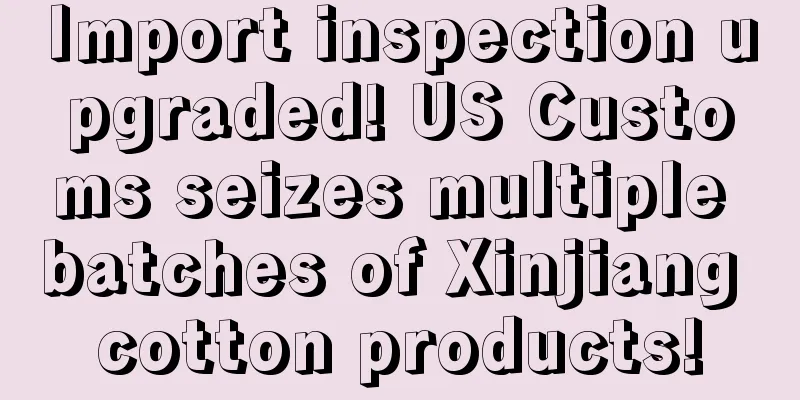Import inspection upgraded! US Customs seizes multiple batches of Xinjiang cotton products!

|
It is learned that according to foreign media reports, about 27% of the imported shoes and clothing seized by the U.S. Customs and Border Protection in May were related to cotton produced in Xinjiang, China. In June last year, the U.S. Customs banned all Xinjiang cotton products on the grounds of forced labor. In fact, as early as December 23, 2021, U.S. President Biden signed the Uyghur Forced Labor Prevention Act (UFLPA) into law. According to the Freedom of Information Act, 10 of the 37 garments seized by U.S. Customs in May were returned and identified as containing Xinjiang cotton. The documents also show that to date, U.S. Customs officials have seized three batches of shoes and clothing containing Xinjiang cotton from China, on December 22, 2022, April 11, 2023, and May 23, 2023. Of the 86 tests conducted by the U.S. Customs and Border Protection, 13 tests showed that the origin of the cotton was Xinjiang cotton, accounting for 15%. Most of them involved clothing such as underwear, jeans, T-shirts, baby onesies and dresses. To assist in law enforcement, U.S. Customs and Border Protection has used isotope detection methods to identify and block imports of Xinjiang cotton products by linking cotton to specific geographic regions by analyzing the concentrations of stable elements such as carbon and hydrogen in crops and growing environments. Eric Choy, director of trade remedies and enforcement at U.S. Customs, said isotope testing is not yet a "routine procedure" at U.S. Customs. He added that officials at individual U.S. ports could request testing if they receive allegations about specific shipments or suspect they have links to Xinjiang. According to a federal report released last year, Xinjiang cotton production accounted for about 87% of China's production in 2020 and 2021, and 23% of the global supply. Although countries such as Vietnam, Cambodia and Bangladesh are the world's largest producers of cotton clothing and consumer goods, they still import a large amount of finished fabric from China. Therefore, many Xinjiang cotton products are still sold to the United States. To ensure compliant imports, companies such as Victoria's Secret, Ralph Lauren and Shein have partnered with isotope testing company Oritain to verify the origin of cotton in their supply chains. Since 2020, U.S. Customs has paid Oritain more than $1.3 million for cotton product testing. U.S. Customs officials say isotope testing alone is not enough to clear goods detained at U.S. ports for suspected links to Xinjiang. More retailers and manufacturers are using the analytical method to "spot check" links in the supply chain, from yarn to finished fabrics. Editor ✎ Nicole/ Disclaimer: This article is copyrighted and may not be reproduced without permission. |
<<: Growth drivers of the US toy market: the rise of nostalgia, old kids and social media marketing!
>>: Shopify launches new plug-in to integrate with TikTok Shop sales
Recommend
What is Cross-border Tongbao? Cross-border Tongbao Review
Cross-border Tongbao E-commerce Co., Ltd. (referre...
A large number of Amazon sellers' products have been removed from the shelves! The reason is...
As the epidemic rages in Europe, more and more non...
What is Harbin E-Tong Technology & Trade Co., Ltd.? Review of Harbin E-Tong Technology & Trade Co., Ltd.
Harbin Russian Express Technology and Trade Co., L...
Dianxiaomi strategically acquires Kuaxintong, accelerating its globalization process
It is learned that on February 20, the cross-borde...
Can the volume of self-delivery reach several hundred million? Post-95s enter the leading domestic e-commerce companies to open up new markets, but the company hopes to achieve a 50% profit margin on Amazon instead of a meager 5% profit...
MrStephen My C position I have been back for one a...
The unique pain points of each Amazon site
Scan the QR code to join our seller family More i...
7,000 people petitioned my brother-in-law not to return to Earth! Will cross-border financing be affected by the constant turmoil of big sales?
It is learned that Amazon founder Jeff Bezos will ...
28 essential Amazon operating knowledge and common problem response strategies
1. Classification review entry: 2. The ad was cli...
What is Hashtracking? Hashtracking Review
Hashtracking is a social media analysis tool. Offi...
Amazon account scanning storm strikes again! A new batch of sellers are affected and their accounts are blocked!
Just a few days after the start of work, Amazon st...
Amazon Off-site Promotion Strategy- How to Double Your Sales
According to statistics, 90% of sellers focus on ...
18 Amazon Inbox Email Templates
1、亚马卖家发货到达时间邮件模板DearThank you so much for your gre...
What is Viralix? Viralix Review
Viralix offers a range of services for Amazon sell...
Will there be another bug after the membership day? A large number of orders are displayed delayed and ranking updates are lagging!
▶ Video account attention cross-border navigation ...
29 ways to open a case on Amazon
4. Feeds/Template Issues If you have a Bach ID Ge...









